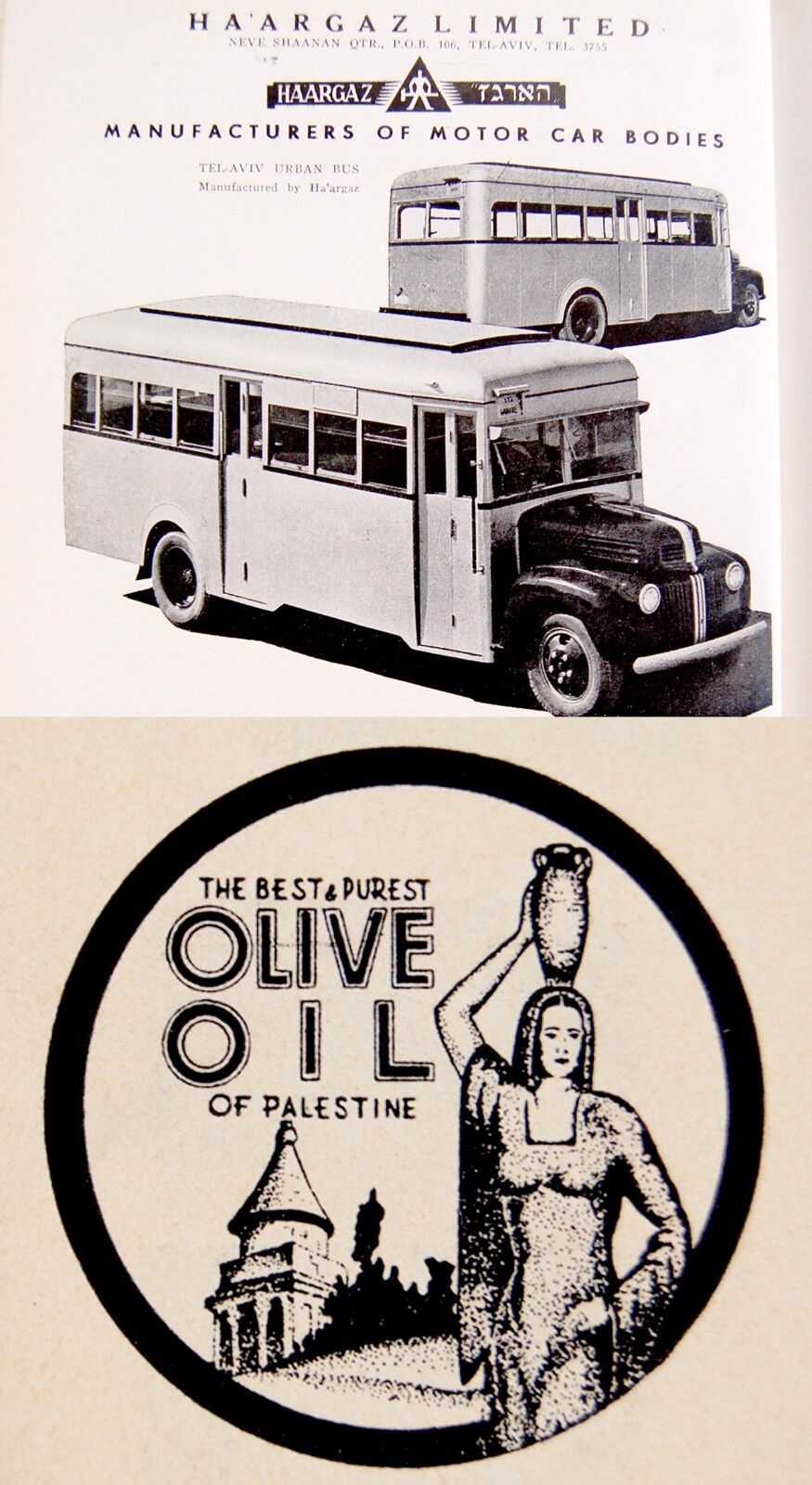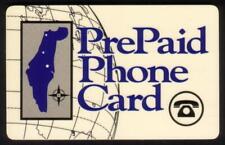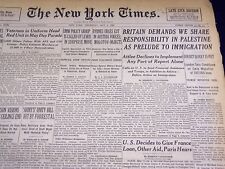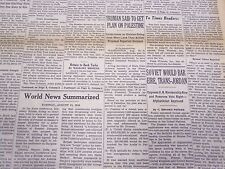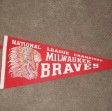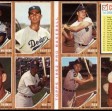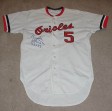When you click on links to various merchants on this site and make a purchase, this can result in this site earning a commission. Affiliate programs and affiliations include, but are not limited to, the eBay Partner Network.
DESCRIPTION : Here for sale is an EXTREMELY RARE book - Catalogue which was published in ERETZ ISAEL ( Then also refered to as PALESTINE ) almost 75 years ago in 1946 ( Dated ) . The frofusely illustrated and photographed TRADECATALOGUE is named " PALESTINE TRADE CATALOGUE" and it was published in 1946 by the BRITISH MANDATE GOVERNMENT of PALESTINE to present , promote and advertise various manufactors in various fields in Eretz Israel - Palestine industry. . The catalogue ( Or DIRECTORY as a matter of fact ) depicts literaly MANY HUNDREDS of FIRMS , PRODUCTS and BRANDS . a most significent LARGE CHAPTER , Around 50 pp is dedicated to PALESTINE TRADEMARKS - Around 250 TRADEMARKS , LOGOS , EMBLEMS and SIGNS of the most popular ERETZ ISRAEL - PALESTINE manufactors of : SCALES , BUSES, TOYS , GIFTS, GAMES, CLOTHING , SHOES WERE , HOUSEHOLD , Silverwere , PENS , Stationary products , Cigarettes, Tobacco products , Wine products, Beer brands, Chocolate, Sweets , Dairy products , Food products, Sweets , Citrus products, Jaffa Oranges , Oil and Olive Oil products , Preserved Food products, Alcoholic beverages , Wine, Beer , Cognac , Detergents, Cosmetics, Soaps etc. HUNDREDS of Eretz Israeli industrial manufactors of PACKAGES , BOTTLES, BOXES , LABELS , LOGOS , ADVERTISEMENTS . A GENUINE TREASURE of ERETZ ISRAEL- PALESTINEindustrial manufactors and products.NUMEROUS advertisements and LOGOS. A TREASURE BOX of EPHEMERA.Originalillustrated HC. 7.0" x 10.0" . 280 throughout illustrated andphotographedpp + plates pages . Very goodcondition. Tightly bound. clean. Very slight shelf staining at edges of cover. ( Pls look at scan for accurate AS IS images ). Book will be sent inside a protective rigid packaging . Animportant remark : A fewother similar TRADE CATALOGUES were published and are available - Presenting many otherISSUES and PRODUCTS of various disciplines . Please let me know if and whatsubject interests you and I'll try to provide.
AUTHENTICITY : ThisistheORIGINALEretz Israel - Palestine 1946 edition( Dated ), NOT amore recent editionor a reprint , Itholds alife long GUARANTEE for its AUTHENTICITY and ORIGINALITY.PAYMENTS : Payment method accepted : Paypal& All credit cards.
SHIPPMENT : SHIPP worldwide via registered airmailis $ 29. Domestic $15 only with buy it now . Book will be sent inside a protective rigid packaging . Handling around 5-10 days after payment.
PALESTINE PRODUCTS : Dubek Ltd. is Israel's leading andlongest-established cigarette manufacturer. The company produces, markets anddistributes cigarettes, cigars, lighters and smoking accessories. Dubek isIsrael's sole manufacturer of cigarettes and its brands include Time, Noblesseand Golf. Dubek was established in 1935 by Martin Gehl, a German emigrant witha Zionist vision of establishing a manufacturing base in Israel. In 1960, Dubekbecame one of the first companies to be publicly traded on the Tel Aviv StockExchange. Throughout the years, Martin Gehl together with his son Zorach,expanded the business and took over all other cigarette manufacturers inIsrael. Leaving Dubek as the only company in the field. In 2003 Dubek became aprivate company. Today the company is headed by Dr. Roy Gehl, Martin Gehl'sgrandson and its main offices are situated in Martin Gehl Street named afterits founder. *Noblesse(Hebrew: נובלס) is an Israelicigarette brand produced by Dubek, Israel's oldest cigarette manufacturer. The brand,launched in 1952 in a distinct green, 80mm, 'soft-pack' which has never beendramatically changed, is the oldest in Dubek's product line. The cigarette alsohas the highest tar (19mg) and nicotine (1.3mg) amounts available on theIsraeli mass-market. Dubek has since released two different versions under thesame Noblesse brand; a lower nicotine/tar blend in light-green packaging(Noblesse Blend - it is illegal to use the term 'lite' on cigarettes in Israe, andan even lower nicotine/tar blend in blue packaging (Noblesse American Blue).Noblesse cigarettes are also distributed or sold by the Israel Defense Forcesto soldiers in Israeli military prisons. Company name: Dubek Ltd. Year ofEstablishment: 1935 Nature of activity:The company is theonly cigarette manufacturer in Israel, manufacturing, marketing anddistributing various cigarette, cigar, lighter and smoking accessory brands inIsrael, the Palestinian Authority, Gaza Strip and the West Bank. In addition,the Company also imports its brands to a number of countries overseas. Brands:As the only cigarette manufacturer in Israel, Dubek has assumed the missionof developing, manufacturing and marketing an extensive variety of cigarettebran suitable for the Israeli audience in terms of various blend flavors andstrengths. Company brands include Time, Noblesse, no. 9, Mustang, Europe,Nelson, Sheraton, Montana and Broadway. In addition to the brands manufacturedin the Company's factory, the Company exclusively import brand manufactured bythe Danish company House of Prince: Wall Street, Rockets and Slim Agenda.Dubek employs maximal efforts to provide its clients a large variety ofhigh-quality products, while maintaining constant innovation and offering asolution to the entire Israeli population, for all its sectors. The Company'sbrands enjoy an international reputation of excellence and have won many goldmedals for quality in the prestigious international competition "MondeSelection". Dubek, is a leading manufacturer of cigarettes and tobacco products,one of the first companies in Israeli industry. In 193 the Company wasestablished by a group of Industrialists, including a mechanical engineer whospecialized in equipment for the tobacco industry – Mr.Martin Gehl. Since its establishment, the Company has been persistent inmanufacturing high quality cigarette products. In 1960 the Company becameone of the first public companies traded on the Tel Aviv Stock Exchange. In1965 Dubek introduced its flag cigarette brand: "Time" – whichhas become the favorite and most sold cigarette brand in Israel over the years. In 1971 Dubek purchased twocompeting tobacco companies and became the only cigarette manufacturer inIsrael! Headed by Mr. Zorach U. Gehl, fourth generation of cigarettemanufacturers, Dubek became a modern and efficient factory in the Israeliindustry. In 1985 Dubek was ranked 11 on the Dun &Bradstreet list of "The 100 leading companies in IsraeliEntrepreneurship" In 2003 Dubek became aprivate company. In 2004 Dubek received exclusive representation rightsfrom the Danish "House of Prince" Company for its cigarette andtobacco products and began distributing its brands. EuromonitorInternational's Tobacco in Israel market report offers a comprehensive guideto the size and shape of the market at a national level. It provides the latestretail sales data, allowing you to identify the sectors driving growth. It identifiesthe leading companies, the leading brands and offers strategic analysis of keyfactors influencing the market - be they new product developments, packaginginnovations, economic/lifestyle influences, distribution or pricing issues.Forecasts illustrate how the market is set to change. Buy online to accessstrategic market analysis and an interactive statistical database of duty paidretail volume and value sales, illicit trade volume, company and brand shares,pricing, distribution and production data. Carmel Winery is a vineyard and wineryin Israe. Founded in 1882 by Edmond James de Rothschild, its products areexported to over 40 countries OverviewCarmel Winery manufactures mainly wine, brandy and grape juice.It is the prime producer of wine in Israel, as it produces nearly half of theIsraeli wine market, and one of the largest wine producers in the EasternMediterranean. It is the first and oldest exporter of wine, brandy and grapejuice in the country, and also the largest producer of kosher wine in theworld. The company is owned by the council of the Vine-growers Union (75%) andthe Jewish Agency for Israel (25%). Its parent company is Societe CooperativeVigneronne des Grandes Caves Richon Le Zion & Zikhron Ya'akov Ltd. (S.C.V.)The company holds the two largest wineries in Israel, as well as three newboutique wineries. These wineries include Rishon LeZion Winery, Zikhron Ya'akovWinery, Yatir Winery (50%) and Ramat Dalton Winery. In addition, the companyowns 1,500 hectares (3,750 acres) of vineyards in Israel. Carmel's productionreaches 25-30 million bottles per year and its profit from export adds up toUSD 5 million from 40 countries. HistoryWhen the settlers of the First Aliyah, Jews who immigrated to Palestinefrom Eastern Europe in the second half of the 19th century, encountereddifficulties in cultivating the land due to their lack of experience and thesoil's characteristics, they began to seek support outside of Palestine forestablishing vineyards and wineries. Their representatives traveled to France,where they met Baron Edmond de Rothschild, owner of Château Lafite. As aZionist, Rothschild provided financial and moral assistance to the settlers.His first vineyards were planted near Rishon LeZion, south east of Jaffa. In1882, French rootstock was imported, and the Baron sent his own winespecialists to advise the pioneers in this enterprise. Construction began on alarge wine cellar in Rishon LeZion. Later, a second winery was established in ZikhronYa'akov, situated on Mount Carme just south of Haifa. In 1895 Carmel Wine Co.was formed to export wines of Rishon LeZion and Zikhron Ya'akov, first inPoland, then in Austria, Great Britain and the United States. In 1902 CarmelMizrahi was founded in Palestine to market and distribute wines to the citiesof the Ottoman Empire. In 1896, the first Carmel wines were presented at theInternational Exhibition of Berlin at a special pavilion devoted to theindustries of the Jewish colony in Palestine. Over a hundred thousand peoplevisited the exhibition, looked at the products, and drank a glass of RishonLeZion wine. A year later, a world gardening exhibition was held in Hamburgwhere the settlers' wines were well received. Rishon LeZion wines won a goldmedal at the Paris World's Fair in 1900. In 1906, both the vineyards and themanagement of the two wineries were deeded to the winegrowers, forming the"Societé Cooperative Vigneronne des Grandes Caves, Richon le Zion andZikhron Jacob Ltd." Interestingly, many of Israel's historical figuresworked in the vineyards and in the wineries. Perhaps the two most famous werethe first Prime Minister of Israel, David Ben Gurion and his successor, LeviEshkol Through the early decades of the 20th century the wine business bloomed.Branches of Carmel Wine Co., were opened in Damascus, Cairo, Beirut, Berlin, London,Warsaw and Alexandria and sales increased, particularly during the First WorldWar, when allied troops passed through Palestine. However, the businesses fellsharply when the war was over. The industry lost its principal markets inRussia due to the October Revolution, in the United States because of Prohibition,and in Egypt and the Middle East because of Arab nationalism. Many of thevineyards were uprooted and replanted with citrus trees. However, during the SecondWorld War, the industry began to grow again and with successive waves ofimmigrants, drinking habits gradually changed. In 1957, the estate of the BaronEdmond de-Rothschild deeded over the two wineries to the Cooperative ofWinegrowers, the Societé Cooperative Vigneronne des Grandes Caves, by then,better known under the trade name Carmel Mizrahi in Israel and Carmelworldwide. For some years after the end of the war, Carmel's output was focusedon sweet wines used for sacramental purposes. However, with the emergence ofthe new world in wine making, Israeli wine makers sought new varieties ofgrapes, thus in 1971 Cabarnet Sauvignon and Sauvignon Blanc, the first varietalwines from Israel, were presented in the United States market. In the early80's, the wine industry in Israel fell upon hard times, but in the second halfof the decade, wine became more popular and demands for quality stimulatedtremendous improvements in the varieties of grapes being grown, the cultivationof new growing regions and the updating of fermentation and productiontechniques. Over the past few years, new state of the art wineries have beenbuilt, the existing wineries have been renovated and a new team of young,highly qualified wine makers have been employed. The constant search forimprovement is now part of the fabric of the cooperative. In 2003 Carmel agreedto sponsor 'Carmel Trophy for Best Eastern Mediterranean Producer' at I.W.S.C.in London. In 2004 Peter Stern (formerly at Mondavi & Gallo) fromCalifornia was appointed wine making consultant. The same year Carmel founded'Handcrafted Wines of Israel'. Exporting to over 40 countries, Carmel productsare found in wine stores and retail chains around the globe. Wineries Carmel's firstwinery and head office is Rishon LeZion Winery, which is located in the city ofRishon LeZion. It was built in 1890 by Baron Edmond de Rothschild, making itthe oldest industrial building in Israel still in use. The winery is thelargest winery in Israel in terms of production of wines, spirits and grapejuice. It was the first establishment in Israel to install electricity andtelephone, and David Ben Gurion, Israel's first prime minister, worked there.It underwent renovations in the 1990s. Carmel's second winery is ZikhronYa'akov Winery. Located in Zikhron Ya'akov, it is used for production of wineand blending of olive oil. It was built in 1892, also by Baron Edmond deRothschild. The winery is the largest winery in Israel in terms of grapesreceived at harvest. It includes a new boutique winery built in 2003 and apilot micro-winery for research and development. Yatir Winery is a small winerybuilt in 2000 with state of the art equipment, which receives grapes only fromits own vineyards. It is situated in Tel Arad, an archaeological site with3,000 years of history, in the northeastern Negev. The winery was a jointventure between Carmel (50%) and Gadash local wine growers (50%). Yatir Wineryis now solely owned by Carmel Winery. Its vineyards are located in Yatir Forestin the southern Judean Hills. Another newly built winery is Ramat Dalton,located in Ramat Dalton, Upper Galilee. It was built in 2004 and receives itsgrapes from vineyards in Upper Galilee and Golan Heights. Vineyards Carmel Winery ownsnumerous vineyards across Israel, from the Galilee and the Golan Heights in theNorth to the Negev in the South. These vineyards include some of the finestindividual vineyard sites in the country. On average, Carmel harvests about25,000 tonnes of grapes, which is approximately 50% of Israel’s total harvest.Exported wines will show the growing region on the label. In the Galilee andGolan, which are generally accepted as Israel’s finest wine growing areas dueto their higher altitude and cooler climate, Carmel's vineyards focus ongrowing quality grapes. Carmel has vineyards in the central and northern Golanand it is the leading winery presence in the premium Upper Galilee. The grapesfrom the finest vineyards go to Ramat Dalton Winery. The coastal regions of Sharonand Central Coastal Plain are Israel’s traditional grape growing areas, whereCarmel's vines were originally planted. In the northern Sharon Plain, Israel'slargest wine growing region, benefiting from Mount Carmel Range and frombreezes off the Mediterranean Sea, Carmel owns extensive areas of vineyards.The main concentration of vineyards is in the valleys surrounding the winerytowns of Zikhron Ya’akov and Binyamina. This is the largest region for Carmelwhich surrounds the Zikhron Ya’akov Winery. It was announced in early 2008 thata 150-acre (0.61km) wine park would be created on the slopesbetween Zikhron Ya'akov and Binyamina in order to promote tourism in the areaand wine tourism in Israel in general.The Central Coastal Plain (known asDan) and the rolling hills of the Judean Lowlands make up the second coastalregion, in which grapes have been traditionally grown. This is the secondlargest area for growing vines in Israel, as it has a coastal Mediterraneanclimate: hot, humid summers and warm, mild winters. It is a large region forCarmel and it supplies the Rishon LeZion Winery. In the Judean Hills, an areaproved to yield grapes of high quality due to its warm days and cool nighttimetemperature, Carmel has premium vineyards in Yatir Forest, the largest forestin Israel. These vineyards, which are up to 900 meters above sea level, supplygrapes for the boutique Yatir Winery. Carmel is a pioneer in the Negev, apopular area for vine growing in ancient times, with its high quality RamatArad vineyard situated on the north east Negev plateau, 500 meters above sealevel with very hot days and cold nights. Tnuva, or Tenuvah, (Hebrew:תנובה, fruit or produce)is a cooperative (co-op) in Israel specializing in milk and dairy products. The620 members of the cooperative are made up a large number of kibbutzim (orcollective farms) and moshavim (or agricultural communities) in Israel. Tnuvais the largest dairy products manufacturer in Israel; its sales account for 70%of the country's dairy market as well as sales of meat, eggs and packaged food.Tnuva Central Cooperative for the Marketing of Agricultural Produce in IsraelLtd. was created in 1926, following a decision by kibbutz-movement leaders tomake cooperatives to distribute and export several types of food products.Tnuva was created as a result but at first only delivered regular milk fordrinking. It expanded to cover other dairy products in the 1930s. Tnuva waslabeled by the Israel AntiTru Authority as a monopoly a status that essentiallyplaces the company under government regulation limiting the way it can changethe price of its products to protect the consumer and smaller competitors. In2006, it was reported that the Markstone Capital Partners Fund was interestedin purchasing Tnuva and its assets for about $750 million. The general manager,Arik Reichman, values the company between $800 million to $1 billion. Anotherobstacle to selling the company or even a large minority share was the need toconvert the cooperative to a company requiring a majority of the membersapproval. In November 20, 2006 Apax Partners Worldwide LLP, a London-basedbuyout firm, won a tender to buy control of Tnuva. The offer values the privatelyheld food and dairy group at $1.025 billion, larger than Strauss-Elite Ltd. andOsem Investments Ltd. the two largest publicly held Israeli foodcompanies. The Tnuva Story For nearly80 years, Tnuva has provided consumers in the Holy Land with a wide variety ofpremium dairy and cheese products that are made with the freshest ingredients.Today, Tnuva is a billion dollar food conglomerate that is playing an integralrole in the global food economy by offering a wide variety of quality productsto millions of consumers in the Middle East, Europe and the USA. Tnuva's Mediterranean-style cheese and dairy products are produced incutting-edge dairy production facilities located amidst pastoral Galileanhills and valleys. Tnuva's popular line of cheeses known as Emek, is derived from theHebrew word for 'valley.The distinctive blue, red, green and white company logohas become a magnet for consumers in Israel and the USA who demand quality andquantity. In order to cultivate the changing dietary demands of sophisticatedconsumers on both sides of the ocean, Tnuva prides itself on producing a largenumber of innovative low-calorie and low-fat products that taste great and areeasy on the waist. Tnuva relishes the challenge of offering consumers a uniqueshopping experience, as well as providingunique culinary tips to amateurand professional chefs. Tnuva Food Industries supplies the milk in the land ofmilk and honey, and, as one of Israel's largest food companies, it has notrouble keeping its dairy and meat divisions separate. Tnuva's dairy divisionsupplies fluid and cultured milk products, butter, soy-based drinks, andcheeses throughout Israel. It markets the Yoplait brand in that country aswell. The company's other food divisions are major processors and suppliers ofchicken, eggs, fish, meats, frozen pizza, and deli items. Tnuva's subsidiary,Sunfrost, makes frozen vegetables. London-based investment firm, Apax Partners,owns 55% of the company; Israeli investment firm, Mivtach Shamir Holdings, owns20About Shemen Industries Ltd The Idea The idea of innovating and founding an industry in Israel was firstraised in the beginning of the previous century by a group of Hovevei Zion fromMinsk, Russia. In 1903, Nahum Wilboshvitz (later known as Wilbosh), whoheaded the group, came to Israel in order to check the possibilities ofindustrial development in the country: searching for energy sources, examiningways of improving and developing the traditional industries, mainly of oil andsoap. Wilbosh proposed to establish a company, which will engage insecondary production of olive oil made of rape once the oil is extracted. Atthe time, the process was performed using wood-pressers. Wilbosh suggestedusing chemical resources such as gasoline. The Foundation On a crowdedland with olive plantations and oil-pressers that sell rape, a place was found.100 dunam were bought from the land of Haditha village (located north-east ofLod). Wilbosh traveled to Europe in the purpose of learning the processof chemical extraction and ordering the required equipment. "Hadid"factory, later known as "Ben-Shemen", was established in 1905 withthe financial assistance of Jews from Tzritzin who accepted Wilbosh'senterprise. The factory began working by the end of January 1906, when all theequipment arrived. The first season was not particularly blessed – out of 260tons of rape, only 10% of oil was produced, and by the end of the season, theamount of oil reduced to merely 5-6%. The factory was used by Petach-Tikva andRehovot's farmers. "Atid"Factory In 1906 Wilbosh married Shoshana Fineberg.Along with Shmuel and Eliyahu Berlin, he founded "Atid" company: afactory for oil and soapwort (i.e. extracting rape oil and soap). "Achadha'Am" named the factory and "Hadid" factory joined the company.After purchasing a property on the seashore in Haifa, the factory was builtfrom hewn stone (later it became a museum of oil industry). Nahum Armanmanaged the soapery, and the number of "Atid" workers amounted to 100families within two years. Once the iron-pressers started working in thetraditional industry, the percentage of rape oil decreased meaningfully, andthus, rape oil gradually became less profitable. Due to economicdifficulties, the factory was shut down in 1910 and the factories were leased.Nahum Arman continued with a limited soap manufacturing until 1922. Establishing "Shemen" Despite the difficulties, Nahum Wilbosh did not give up, and in 1919he founded "Shemen" company in London together with his brothersMoshe and Gedaliah Wilboshvitz and Eliyahu Panison. Since they needed a dutyfree port in order to export, they planned on building one near Caesarea.Houses were leased and schemes were written, but the British governmentobjected, in spite of Zeev Jabotinsky's lobbyism. In 1922 Nahum andGedaliah Wilboshvitz began establishing "Shemen" factory near"Atid" factory and started assembling the machines. In the newfactory, advanced methods of manufacturing and machinery were integrated – hydraulicpressers and diesel engines as well as a modern refinery and soapery. Thefactory's engines were inaugurated in December 1924 by the British HighCommissioner, Sir Herbert Samuel. "Shemen" factory put mucheffort in prompting and marketing the consumption of Israeli products, and wasamong the first factories which took a major part in building thecountry. The Modern Oil Industry At later times it was found that extracting oil from olives rapedamages the oil quality, and therefore, this method of oil production was stoppedat the late 70's. The oil industry moved to producing oils from grains ofdifferent plants such as: soybean, safflower, sunflower and corn whereas theolive oil industry returned only to a mechanical method of manufacturing byolive crushing, extracting the mash and separating the oil juice from the oil.Today "Atid" factory is located on the grounds of the"Shemen" factory in Haifa, and it has a museum which displays the oilindustry in Israel, since ancient times to the beginning of manufacture until nowadaysThe Jaffa orange, also known as the Shamouti orange, is a very sweet, almostseedless orange exported from Israel. It takes its name from the city of Jaffa.Characteristics Jaffa oranges are very similar to Valencia oranges, though they aremuch sweeter. They are characterized by their oval shape, sweet flavor, andstrong aroma. The peel is light orange in color, and is normally very easy toremove from the fruit. These oranges are very cold-tolerant, allowing them togrow outside of the subtropical regions normally associated with growingoranges. Jaffa oranges ripen in the spring-to-summer months, making it amidseason fruit. Jaffa oranges are susceptible to Alternaria, a type of fungus,and are prone to alternate bearing. History According to DanielRogov, the variety "originated in China and Cochinchina". 2542/74


